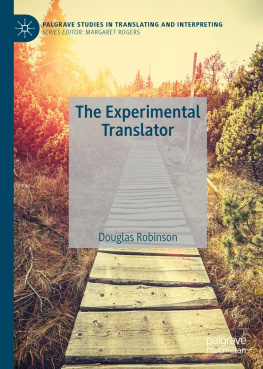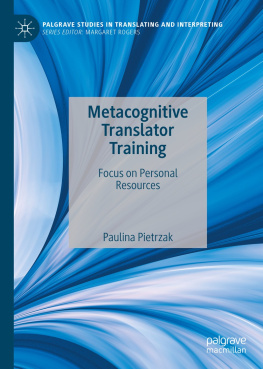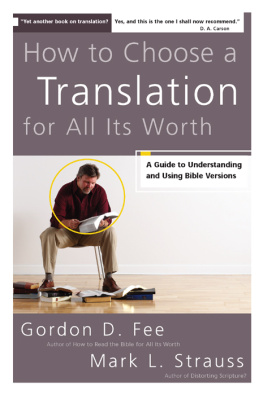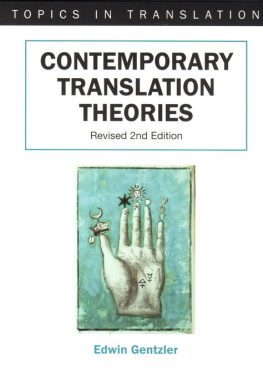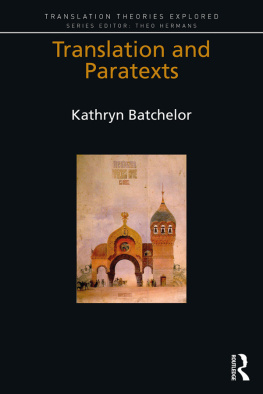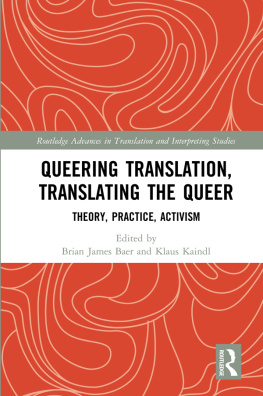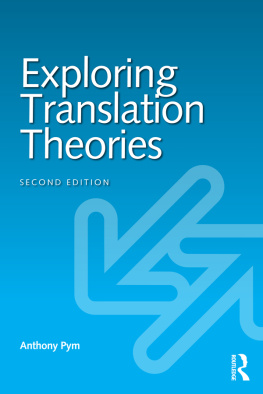Contents
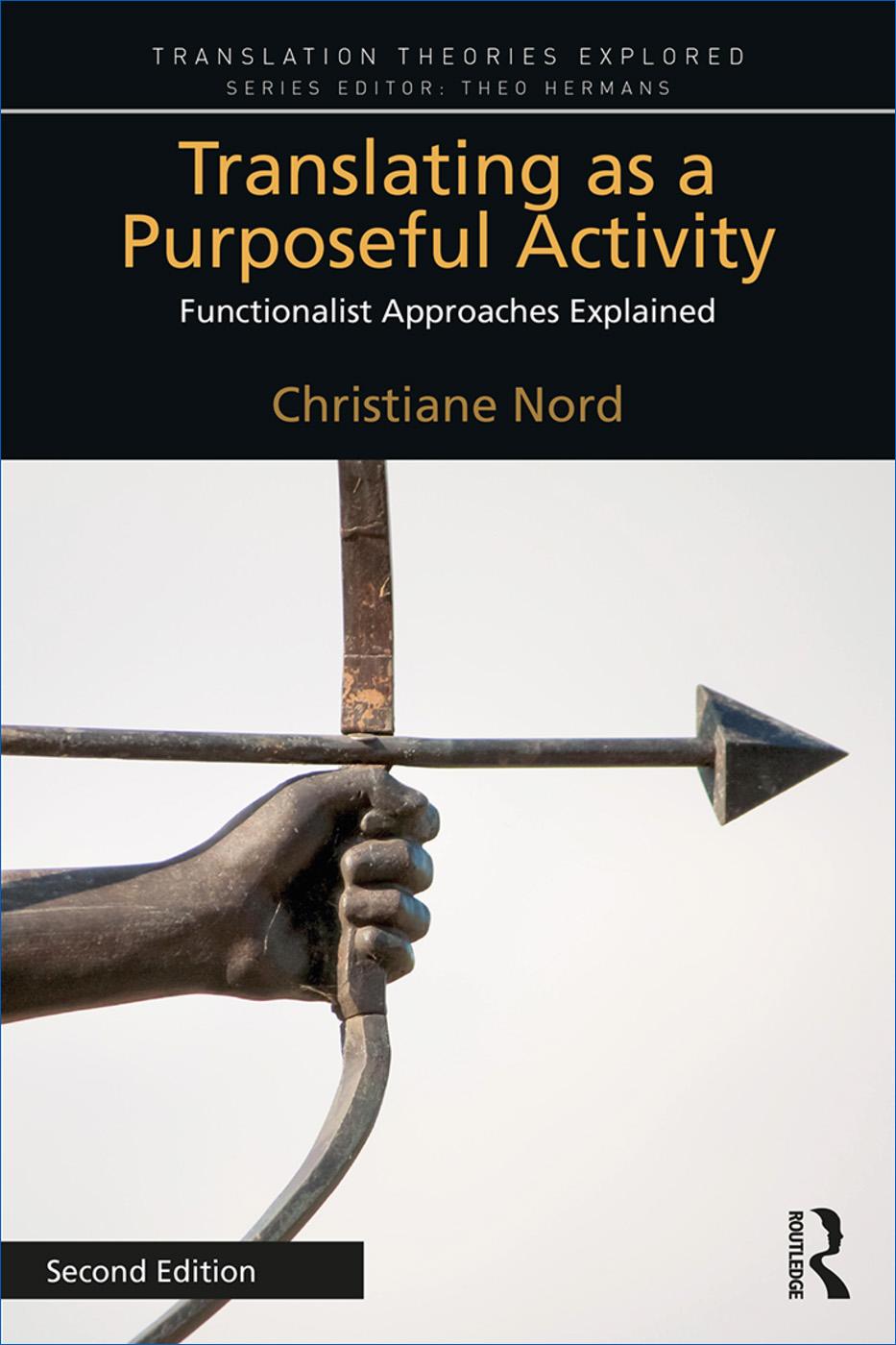
TRANSLATING AS A PURPOSEFUL ACTIVITY
This best-selling text is a comprehensive overview of functionalist approaches to translation in English. Christiane Nord, one of the leading figures in translation studies, explains the complexities of theories and terms in simple language with numerous examples. Covering how the theories developed; illustrations of the main ideas; and specific applications to translator training, literary translation, interpreting, and ethics, Translating as a Purposeful Activity concludes with a concise review of both criticisms and perspectives for the future. Now with a foreword by Georges Bastin and a new chapter covering the recent developments and elaborations of the theory, this is an essential text for students of translation studies and for translator training.
Christiane Nord is Professor Emerita of Translation Studies and Specialized Communication at the University of Applied Sciences of Magdeburg, Germany, and Visiting Professor at several universities of the Peoples Republic of China. She also holds the position of Professor Extraordinary and Research Fellow at the University of the Free State, South Africa. Her homepage can be found at www.christiane-nord.de.
Translation Theories Explored
Series Editor: Theo Hermans, UCL, UK
Translation Theories Explored is a series designed to engage with the range and diversity of contemporary translation studies. Translation itself is as vital and as charged as ever. If anything, it has become more plural, more varied, and more complex in todays world. The study of translation has responded to these challenges with vigour. In recent decades the field has gained in depth, its scope continues to expand, and it is increasingly interacting with other disciplines. The series sets out to reflect and foster these developments. It aims to keep track of theoretical developments, to explore new areas, approaches, and issues, and generally to extend and enrich the intellectual horizon of translation studies. Special attention is paid to innovative ideas that may not as yet be widely known but deserve wider currency.
Individual volumes explain and assess particular approaches. Each volume combines an overview of the relevant approach with case studies and critical reflection, placing its subject in a broad intellectual and historical context; illustrating the key ideas with examples; summarizing the main debates; accounting for specific methodologies, achievements, and blind spots; and opening up new avenues for the future. Authors are selected not only on their close familiarity and personal affinity with a particular approach but also on their capacity for lucid exposition, critical assessment, and imaginative thought. The series is aimed at researchers and graduate students who wish to learn about new approaches to translation in a comprehensive but accessible way.
Translation and Literary Criticism
Marilyn Gaddis Rose
Translation in Systems
Theo Hermans
Deconstruction and Translation
Kathleen Davis
Can Theory Help Translators?
Andrew Chesterman and Emma Wagner
Stylistic Approaches to Translation
Jean Boase Beier
Representing Others
Kate Sturge
Cosmopolitanism and Translation
Esperana Bielsa
https://www.routledge.com/Translation-Theories-Explored/book-series/TTE
Second edition published in 2018
by Routledge
2 Park Square, Milton Park, Abingdon, Oxon OX14 4RN
and by Routledge
711 Third Avenue, New York, NY 10017
Routledge is an imprint of the Taylor & Francis Group, an informa business
2018 Christiane Nord
The right of Christiane Nord to be identified as author of this work has been asserted by her in accordance with sections 77 and 78 of the Copyright, Designs and Patents Act 1988.
All rights reserved. No part of this book may be reprinted or reproduced or utilised in any form or by any electronic, mechanical, or other means, now known or hereafter invented, including photocopying and recording, or in any information storage or retrieval system, without permission in writing from the publishers.
Trademark notice: Product or corporate names may be trademarks or registered trademarks, and are used only for identification and explanation without intent to infringe.
First edition published by St Jerome 1997
British Library Cataloguing-in-Publication Data
A catalogue record for this book is available from the British Library
Library of Congress Cataloging-in-Publication Data
Names: Nord, Christiane.
Title: Translating as a purposeful activity: functionalist approaches explained / Christiane Nord.
Description: Second edition. | Milton Park, Abingdon, Oxon; New York: Routledge, 2018. | Series: Translation theories explored | Includes bibliographical references.
Identifiers: LCCN 2017043268 | ISBN 9781138573369 (hardback) | ISBN 9781138573345 (pbk.)
Subjects: LCSH: Translating and interpreting.
Classification: LCC P306 .N593 2018 | DDC 418/.02dc23
LC record available at https://lccn.loc.gov/2017043268
ISBN: 978-1-138-57336-9 (hbk)
ISBN: 978-1-138-57334-5 (pbk)
ISBN: 978-1-351-18935-4 (ebk)
Typeset in Bembo
by codeMantra
Twenty years after the appearance of the first edition in 1997, published by St. Jerome Publishing, followed by a reprint in 2014 by Routledge, comes this second edition of Christiane Nords insightful book. Extended, revised, and updated, it is a confirmation that functionalism is more front and centre than ever before.
If the early years of translation studies were marked by a linguistic approach of interlingual transfer using equivalence as the yardstick, the 1970s brought about discourse analysis, the consideration of text types, and concern about the effect of translation on the reader. All of this paved the way for the emergence of functionalism. Scholars began to take texts into account as units of analysis. Nords book Text Analysis in Translation (1991) broke new ground, demonstrating a clear understanding and application of intra- and extralinguistic criteria for text analysis. Scholars also turned their attention to the distinctive roles played by the various agents taking part in the communication process through texts. Functionalism Skopos theory in particular brought to the forefront the importance of considering not just the translator but the initiator, the commissioner, the sender and the author, the addressee, the receiver, and the user. Consequently, efficiency in communication became paramount. And what more could a translator hope for than an efficient translation? This is the very thing offered by Skopos theory: a clear and surprisingly easy way to achieve efficiency while communicating others ideas through a foreign language. Nord was still a student when Reiss and Vermeer began enunciating the views that gave birth to Skopos theory. She studied well indeed! She believed in Skopos; while she clearly acknowledges her connection and debt to Reiss and Vermeer, she can be proud of having deepened their heritage, further developed Skopos theory, and brought it into the limelight. One has only to think, in particular, of the central concept of loyalty, which clarifies the role of the translator as an intermediary between cultures and languages. As Nord puts it (1997:123125),



